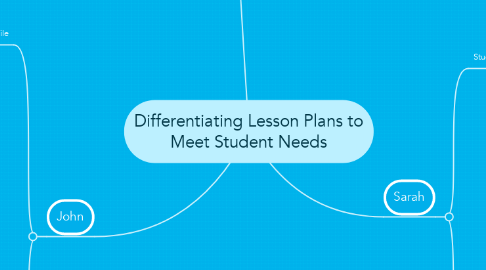
1. Objective
1.1. Next Generation Science Standard
1.1.1. 5-ESS3-1 Earth and Human Activity: Obtain and combine information about ways individual communities use science ideas to protect the Earth's resources and environment.
1.2. 5th Grade
1.3. SWBAT identify at least two ways they can reduce their water consumption at home, and over a period of one week they will track their water consumption, followed by a week of tracking their water consumption while implementing water reducing strategies.
2. Sarah
2.1. Student Profile
2.1.1. Interests
2.1.1.1. Reading
2.1.1.2. Playing piano
2.1.1.3. Cooking
2.1.1.4. Art
2.1.1.5. Computer programming
2.1.2. Level of Readiness
2.1.2.1. Sarah is an excelled student where reading, writing and math performance is above average
2.1.2.2. Sarah finds school to be boring and socially stressful
2.1.2.3. Sarah does not work well in groups and would rather just do all the work herself
2.1.2.4. Sarah can become emotionally anxious with anxiety attacks if other students make fun of her or if she is given too much social attention
2.1.3. Learning Preferences
2.1.3.1. Sarah enjoys working on assignments by herself
2.1.3.2. Sarah excels with abstract concepts and would rather not focus on memorization even though it is easy for her
2.1.3.3. Sarah finishes her work tasks before most students and enjoys having free exploration time on the computer, or reading
2.2. Teaching Strategies
2.2.1. One on one
2.2.1.1. Peer-to-peer activities where Sarah can practice speaking her interests and ideas to a peer while also listening to others
2.2.2. Independent work
2.2.2.1. Sarah can engage in topics of her interest through self-discovery and research
2.2.2.2. Sarah is able to work solo at great lengths and this will give her a chance to calm down if her social anxiety becomes a problem
2.2.3. Project-based learning
2.2.3.1. Even though this is a stressor for Sarah she can work on improving her social skills through PBL
2.2.3.2. Projects that have clear roles already assigned help to improve her success within the group
2.2.3.3. Sarah will perform better with other students of higher ability, but if she is paired with students of lower ability she will end up doing most of the work herself
3. John
3.1. Student Profile
3.1.1. Interests
3.1.1.1. Physically active sports
3.1.1.2. Fishing and playing in the woods
3.1.1.3. Building models, forts, legos
3.1.1.4. Art and puzzles
3.1.2. Level of Rediness
3.1.2.1. John is at or just below grade level depending on the subject
3.1.2.2. John reads and writes at a fourth grade level
3.1.2.3. John below average in Math but performs above average in Science
3.1.2.4. John is easily distracted in class and needs frequent breaks and recess time, especially outdoors
3.1.3. Learning Preferences
3.1.3.1. John prefers hands on activities
3.1.3.2. John enjoys working in groups on projects
3.1.3.3. John can focus in class if he has choice in his learning activites
3.1.3.4. John also has increased engagement when he is allowed to take a break or move from one task to another freely
3.2. Teaching Strategies
3.2.1. Multi-faceted instructional lessons
3.2.1.1. When giving content it would be best to include multiple avenues for understanding. For example, include videos, slides, think-pair-share, repeat after me, open-ended discussion questions, drawing, note taking, and movement in one lesson
3.2.2. Project-based Learning
3.2.2.1. Include projects where directions are clear and one has the option to meet an objective through multiple ways. For example, build a model, create a poster, or write a rap to represent learning
3.2.3. Classroom jobs
3.2.3.1. This is more of a management technique but can also be used in combination with learning outcomes
3.2.3.2. Consider assigning jobs like watering classroom plants or feeding classroom fish as part of a project where John is acquiring knowledge of fish or plants
3.2.4. Behavior checklist
3.2.4.1. John does well when he is working towards a goal and has a defined end
3.2.4.2. This technique is also for behavior management but can easily be put to use with academic work. Consider giving John points for working well for periods of time by himself on desk work

